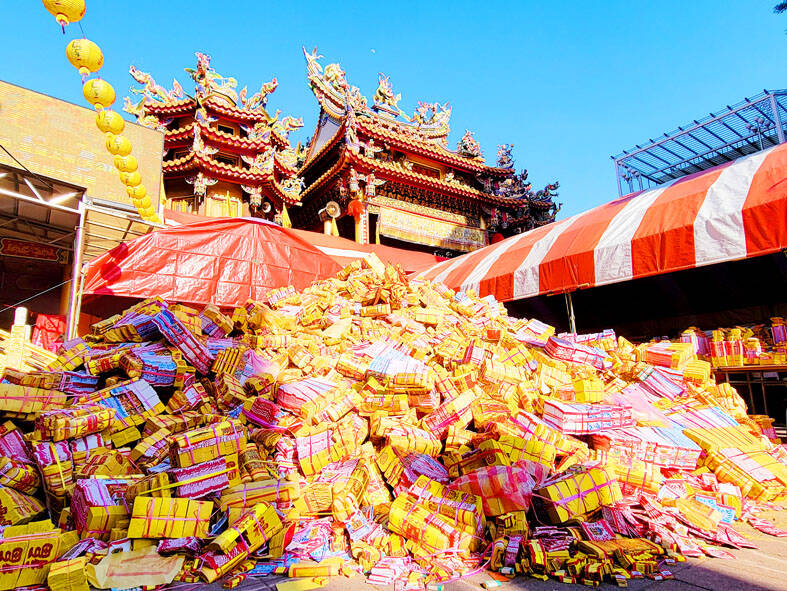People who burn joss paper at universal salvation ceremonies held by environmentally friendly temples can join a lucky draw this year, the Ministry of Environment said ahead of the Ghost Festival tomorrow.
Many Taiwanese prepare food offerings and burn joss paper for deities, ancestors or wandering spirits to pray for peace on the Ghost Festival, the 15th day of the seventh lunar month, or Sept. 6 this year.
Given that burning joss paper releases air pollutants such as carbon monoxide, nitrogen oxide, benzene and PM2.5, the ministry has been promoting three environmentally friendly ways of performing the ritual: burn paper money together, burn less in larger denominations or replace burning with donations.

Photo: Wang Mei-hsiu, Taipei Times
More than 200,000 tonnes of joss paper are burnt in Taiwan every year, Minister of Environment Peng Chi-ming (彭啟明) said at Yuqing Temple (玉清宮) in Miaoli County earlier this month.
That means about 4.8 million trees were cut down every year to meet the huge demand, he said.
The ministry respects the religious culture and expects more environmentally friendly approaches to the ritual would promote public health as well as keep temples clean, Peng said.
The ministry chose Yuqing Temple to advocate environmentally friendly paper-money burning, as it is not only a religious center in the county, but has also pioneered green religious rituals, he said.
For example, the temple implemented the policy of “only one incense stick in each incense burner” as early as 2001, encouraging visitors to place only one incense stick in the burners of the deities they worship, Peng said, thanking the temple for taking the lead.
The temple was founded in 1906 and has become a popular place of worship in the county, Yuqing Temple chairman Wei Chun-chieh (魏俊傑) said.
In 1991, it started receiving complaints from local residents that ash from burning paper money was affecting their quality of life, he said.
In January 2001, the temple imposed a ban on burning joss paper, becoming the first in the country to implement such a policy, Wei said.
The benevolent spirit of universal salvation aligns with the idea of sustainable development, Department of Religious Affairs and Rites Acting Director Lo Su-chuan (羅素娟) said, adding that environmentally friendly worshiping helps reduce air pollution and waste of resources.
Independent Legislator Chen Chao-ming (陳超明) said that locally made joss paper has been losing its market to imports from China or Southeast Asian nations, urging the government to increase the tariff on such imports to protect domestic firms that manufacture environmentally compliant joss paper.
Miaoli County Environmental Protection Bureau official Lai Yi-cheng (賴易正) said that local people or organizations can ask the bureau to help transport collected joss paper to incineration sites to be burnt together.
The county government also introduced other environmentally friendly measures for religious activities, including electronic firecrackers, exhaust ducts for paper money burners and peace rice vending machines, he said.
Ministry data showed that the quantity of paper money collected for collective incineration rose to 32,000 tonnes last year from 21,000 tonnes in 2019, reducing air pollutant emissions by about 1,170 tonnes, equivalent to the annual emissions of 800 old, large diesel vehicles.

The manufacture of the remaining 28 M1A2T Abrams tanks Taiwan purchased from the US has recently been completed, and they are expected to be delivered within the next one to two months, a source said yesterday. The Ministry of National Defense is arranging cargo ships to transport the tanks to Taiwan as soon as possible, said the source, who is familiar with the matter. The estimated arrival time ranges from late this month to early next month, the source said. The 28 Abrams tanks make up the third and final batch of a total of 108 tanks, valued at about NT$40.5 billion

Two Taiwanese prosecutors were questioned by Chinese security personnel at their hotel during a trip to China’s Henan Province this month, the Mainland Affairs Council (MAC) said yesterday. The officers had personal information on the prosecutors, including “when they were assigned to their posts, their work locations and job titles,” MAC Deputy Minister and spokesman Liang Wen-chieh (梁文傑) said. On top of asking about their agencies and positions, the officers also questioned the prosecutors about the Cross-Strait Joint Crime-Fighting and Judicial Mutual Assistance Agreement, a pact that serves as the framework for Taiwan-China cooperation on combating crime and providing judicial assistance, Liang

A group from the Taiwanese Designers in Australia association yesterday represented Taiwan at the Midsumma Pride March in Melbourne. The march, held in the St. Kilda suburb, is the city’s largest LGBTQIA+ parade and the flagship event of the annual Midsumma Festival. It attracted more than 45,000 spectators who supported the 400 groups and 10,000 marchers that participated this year, the association said. Taiwanese Designers said they organized a team to march for Taiwan this year, joining politicians, government agencies, professionals and community organizations in showing support for LGBTQIA+ people and diverse communities. As the first country in Asia to legalize same-sex

MOTIVES QUESTIONED The PLA considers Xi’s policies toward Taiwan to be driven by personal considerations rather than military assessment, the Epoch Times reports Chinese President Xi Jinping’s (習近平) latest purge of the Chinese People’s Liberation Army (PLA) leadership might have been prompted by the military’s opposition to plans of invading Taiwan, the Epoch Times said. The Chinese military opposes waging war against Taiwan by a large consensus, putting it at odds with Xi’s vision, the Falun Gong-affiliated daily said in a report on Thursday, citing anonymous sources with insight into the PLA’s inner workings. The opposition is not the opinion of a few generals, but a widely shared view among the PLA cadre, the Epoch Times cited them as saying. “Chinese forces know full well that